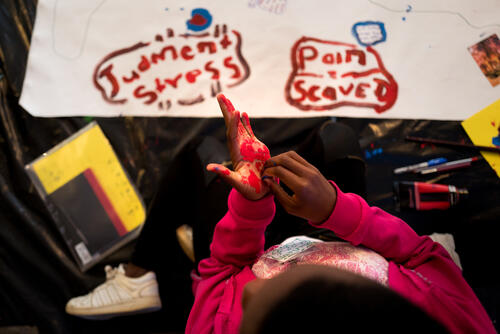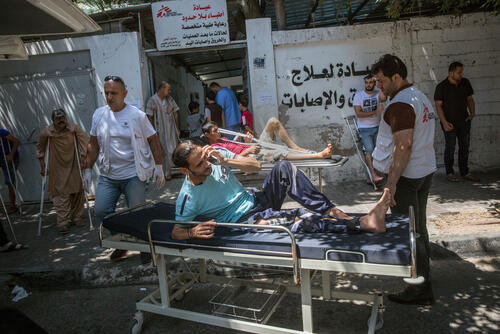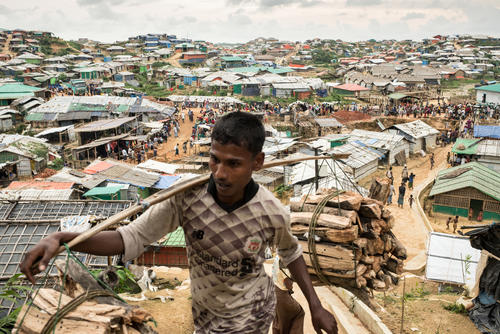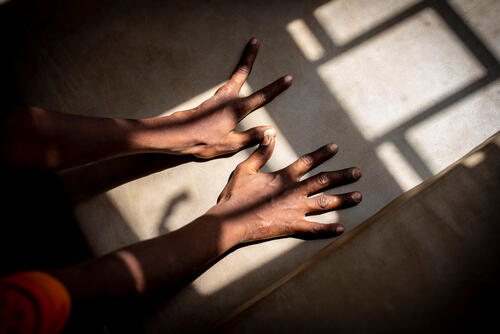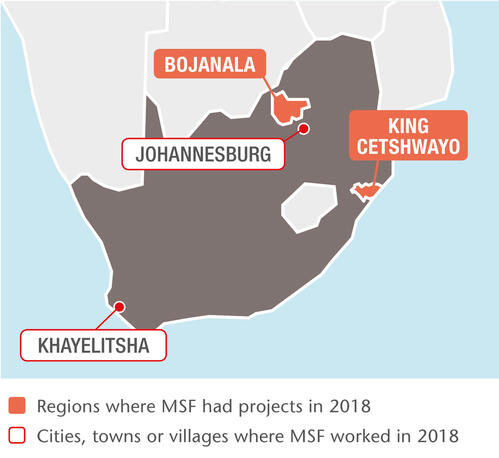
21,000
21,
1,430
1,43
550
55
In 2018, South Africa became the first country in the world to make the oral drug bedaquiline part of its standard recommended treatment for drug-resistant TB (DR-TB), helping to phase out painful, toxic injections and scale up access to more effective, more tolerable treatments – a long-standing MSF goal.
HIV and TB treatment
We are working to increase access to new and repurposed drugs and community-based care for patients with DR-TB through our HIV and TB projects in Khayelitsha, near Cape Town, and King Cetshwayo district, KwaZulu-Natal, while supporting efforts to reach the UNAIDS 90-90-90 targets for people living with HIV.The globally agreed 90-90-90 targets require that 90 per cent of people living with HIV know their status, that 90 per cent of people living with HIV initiate and remain on ARV treatment, and that 90 per cent of people on ARV treatment reach and maintain an undetectable viral load by 2020.
In 2018, we conducted a door-to-door HIV survey through our project in King Cetshwayo district. The preliminary results endorsed the innovative community-based strategies we have implemented since 2011 to reduce HIV and TB incidence, sickness and mortality. In 2018, 22,780 people were tested in the community for HIV and 1,280 were started on TB treatment, including 220 on bedaquiline and/or delamanid.
In Khayelitsha, we enrolled 198 mother and baby pairs in postnatal support clubs, designed to improve care for women with HIV and their HIV-exposed infants. The programme was piloted in 2016 and incorporated into the national HIV treatment guidelines a year later.
South Africa also became part of the multi-country endTB clinical trial aiming to find shorter, less toxic and more effective treatment regimens for multidrug-resistant TB (MDR-TB). We launched the trial in Khayelitsha in May and had enrolled 28 patients by the end of the year.
Care for victims of sexual violence
In Bojanala district, in South Africa’s platinum mining belt, we are helping to expand access to care for victims of sexual and gender-based violence through four dedicated clinics, known as Kgomotso Care Centres, which offer medical and mental healthcare, and social services.
An increasing number of patients are being referred from community-based initiatives, including a school health programme, through which we conducted education sessions reaching 12,670 pupils in 20 schools. Around 27 pupils a month were referred to our care centres in 2018.
We also continue to support termination of pregnancy services for women who request them. Two MSF nurses performed 90 to 100 procedures a month in two community health centres in 2018.
Stop Stockouts Project (SSP)
The SSP is a civil society consortium supported by MSF and five other organisations, which monitors the availability of essential drugs in clinics across the country and pushes for the rapid resolution of stockouts and shortages. In 2018, the SSP helped to identify and raise awareness of stockouts across North West province resulting from health worker strike action.



